Table of contents
There are lots of subsets of DNA tests, and one of them is the Y DNA test. This test has helped customers discover their genetic genealogy, which would not have been possible without it.
This article covers the essential things you should know about Y DNA and Y chromosome DNA testing genealogy.
What is the Y DNA test?
Y DNA test, otherwise called the Y chromosome DNA test, is a male-specific genealogical DNA test used for exploring a man’s patrilineal or direct father’s-line ancestry. To better understand the test concept, you first need to know about the Y chromosome.
The Y chromosome makes a genetic distinction between males and females. It is also called a “sex chromosome” because it determines whether a child will be biologically male or female.
Males receive one X chromosome from their mother (who has two X chromosomes) and a Y chromosome from their father (who has one X and one Y chromosome). The Y chromosome doesn’t change, except if there’s an alteration due to a mutation. If there’s no alteration, then the same Y chromosome your great grandfather got from his father will be passed on to your grandfather and your father, and finally to you.
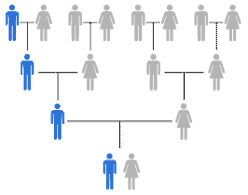
Since there’s little or no alteration in the Y chromosome transfer chain from father to son, the Y DNA test will help males trace their genealogy through their paternal line and learn more about their family history. Although not as definite as a paternity test, you may be able to use Y DNA test to find a father. It can even go more in-depth to search for your great grandfather or your great-great-grandfather, and so on.
Since the Y DNA test only tests the Y chromosome, it gives no information about the maternal lineage because females don’t bear the Y chromosome. You can learn more about the Y chromosome and mitochondrial DNA (genetic information passed from mother to child) on our blog.
How to take a Y DNA test
To take a Y DNA test, follow the directions included in the product. Many tests can be performed at-home. The general procedure includes:
Order the test kit online: You can visit the company’s website directly to place your order. You can also order from third-party websites such as Amazon as well. You’ll receive the test kit at the address you provided.
Open the kit and register: Some Y DNA testing companies require that you register the kit on their website before use. During the registration, you may have to submit specific personal information to aid their research.
Collect the sample: Collect the sample as indicated on the kit. Some kits may require a saliva sample; some may need you to scrub your inner cheek walls with a swab. You’ll find which one is required as part of the information on the label.
Mail it back to the company: Label the sample and send it directly to the company where it’ll be analyzed.
Wait for your result: You may have to wait 4-6 weeks for a Short Tandem Repeat (STR) test or longer for a more comprehensive Big Y-700 test. Most companies will send you an email when your result is ready. You can then login into their website and download your result.
Who can take a Y DNA test?
Y DNA test is only designed for males because the Y chromosome is only inherited through the paternal lineage. For instance, you would be unable to trace your maternal grandfather through Y DNA testing since your mother can’t transfer Y DNA. On the other hand, if you are a male and want to trace regarding your grandfather, running a Y chromosome test would be an appropriate choice.
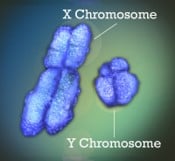
In summary, only a male can take this test to examine the previous male descendant like his father, grandfather, great-grandfather, etc.
Why take the Y DNA test?
If you are a male that wants to trace your genetic genealogy, you can take this test. It can help you to find out more about your long-distant ancestors.
For instance, Y DNA testing allows you to locate common ancestors using a company’s Y-DNA database. Since the DNA remains unchanged on the Y chromosome, you can trace your ancestors along their migration routes, giving you more information on the geographical origins where your male ancestors lived and migrated.
How to find a reliable Y DNA company
Finding a reliable Y DNA company does not have to be difficult. Consider the following tips when choosing a testing company:
Search for Y-DNA testing reviews online
Go online and search for some of the best test companies. Take the time to read about them, including their reviews. The reviews will educate you about how accurate and useful the test results are and how the company deals with customers.
Some companies have customer reviews on their website while others you can find on third party websites like Amazon or independent review companies like Trustpilot. Such reviews on sites other than the company’s page are often more reliable and remove biases.
Read their privacy policy
Reading the privacy reviews of DNA testing companies can help you make the right choice. A company is not reliable if they can’t guarantee your privacy protection with them. Remember that your Y DNA test results contain part of your genetic blueprint and you might not want them to be used by a third-party or compromised by computer hackers.
Hence, it’s good to read the company’s privacy policy and see whether they have all it takes to protect your information or not. Do they have strong security to protect your information? If yes, then they may be the best choice for you.
The Y DNA test explained
There are hundreds of markers on the Y chromosome, but the tests generally examine 10-111 short tandem repeat (STR) markers. The marker test looks at segments of DNA on the Y chromosome. It also looks at the SNP marker. To better understand this concept, let’s break down what these terms mean.
A SNP, or single-nucleotide polymorphism, is a change to a single nucleotide in a DNA sequence. The more SNPs two people have in common, the better the chances are that they’re related. The SNP tests also provide information about the haplogroup.
A haplotype, also known as a signature, a DNA signature, or a genetic signature, is a set of markers on a single chromosome, inherited together. Haplogroups are distinct to geographical locations and can help map where your ancestors migrated.
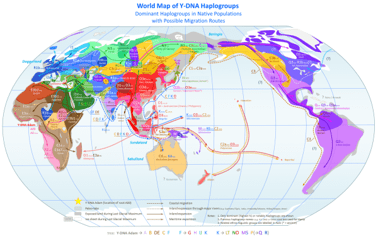
A haplotype is the numbered results of a genealogical test. There are haplotypes with a low frequency of occurrence and ones with a high frequency of occurrence. The ones with a high frequency of occurrence are called common, while the former is called uncommon. The haplotype will help determine under which category your DNA sample falls, whether it is common or uncommon.
Marker, or STRs, are the series of repeating nucleotides that are usually tested for in basic Y-DNA tests. Matching STRs in a Y DNA test indicate a genetic relationship between two males.
Interpreting the test results
The test requires comparing the 12 marker results of one individual to the 12 markers of another individual with the same surname. If the result matches 12/12, there is a 99% probability that the two are related within the time-frame indicated in the MRCA tables.

On the other hand, if the match is 11/12, there’s still a high probability that they’re related, provided that the 11/12 DNA matches are within the same surname.
If you compare the 25 markers of one individual with that of another individual, and you get a 25/25 result, then there’s a 99% probability that the individuals are related at a much closer time frame than the 12 markers.
If you compare the 12 marker results of an individual with another surname but the scores match, then they are most likely not recently related. Recently related means a time frame of about 1000 years or 40 generations.
Nebula Genomics
Nebula Genomics provides a more accurate result than most common DNA tests you may know. For instance, many DNA tests only decode 0.02% of your gene, providing a less accurate result. Nebula Genomics, on the other hand, uses Whole Genome Sequencing to decode 100% of your DNA.
With us, you’re guaranteed an easy delivery of your test kit and an easy sample collection process as well. We’ll process your result on time and notify you through email once it’s ready to view online.
Your privacy is guaranteed with us; hence, you can begin your journey of discovery without risking the confidentiality of your most personal information.
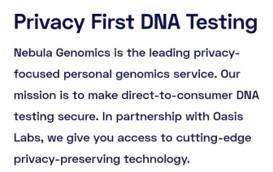
In addition to receiving your whole genome sequenced for less than $299 with Nebula Genomics, you can access deep ancestry reporting with full Y chromosome and mtDNA sequencing.
Family Tree DNA (FTDNA)
What is the best Y DNA test? FTDNA holds one of the world’s largest Y-DNA databases and well known for being one of the best ancestry tests. This means that FTDNA Y DNA tests give you a greater success of finding more relatives and gaining more information as to where your paternal ancestors migrated using their services. Currently, Family Tree DNA Y DNA test offers three test options:
- Y-37: Examines 37 markers (STRs) on the Y chromosome
- Y-111: Examines 111 markers (STRs) on the Y chromosome
- Big Y-700: Examines 700 markers (STRs) and over 200K SNPs on the Y chromosome
Y-37 is a good place to start if you’re interested in close relatives. For expert-level tracing and information, you could consider the more comprehensive BigY-700 test. In addition to the coverage, these tests also differ in cost. The relatively simple Y-37 test costs just $119 while the Big Y DNA test price is up to $449.
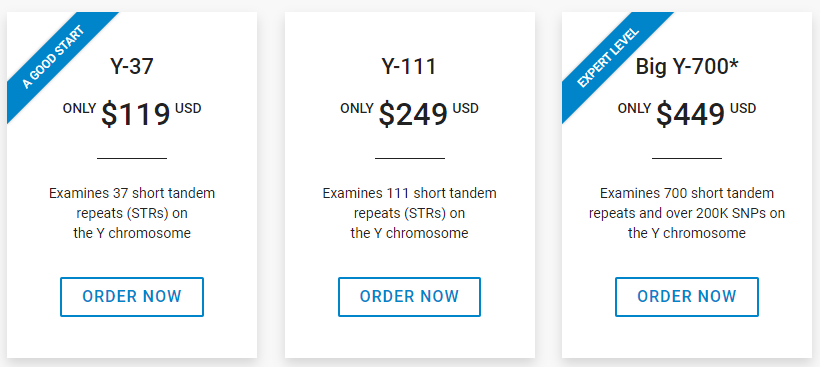
Note that the Big Y-700 test does not include access to raw data. It is available for separate purchase.
DNA testing beyond Y DNA tests: Autosomal, Y DNA and mtDNA testing
Do you want to discover more about your paternal ancestry with a full Y chromosome analysis? Nebula Genomics offers the most affordable way to sequence your entire genome. We also provide access to your raw data and additional genome exploration tools.
You may also be interested in mitochondrial DNA analysis (mtDNA tests) that analyzes your maternal lineage. This DNA is passed from mother to children, allowing both females and males to trace their maternal lines through this means.
Another way to access genetic genealogy is through autosomal testing. Autosomal DNA tests analyze the other 22 chromosomes besides the sex chromosomes (X and Y). This is the most common test to trace cousins and other family members and is used by many DNA testing companies like 23 and Me, AncestryDNA, Family Tree DNA (the Family Finder test), Living DNA, and MyHeritage DNA.
You may also be interested in other DNA tests that test specifically on the Y chromosome such as YSEQ and YFull.
